TRAVELER’S HEALTH IN CHINA

Hygiene Poster
Visitors to China sometimes have health problems. The food and health standards are generally below those of European or North American countries. Dysentery, hepatitis, stomach parasites and malaria occur in China. It is is a good idea to make sure you are up to date with shots and are prepared for both travel-related and serious sicknesses.
Inoculations: No vaccinations are required unless you entering China from a country infected with yellow fever (usually in tropical Africa or South America) and then you need a yellow fever vaccination and documentation of it. It is a good idea to make sure you are up to date with your typhus, diphtheria and tetanus inoculations.
Get the inoculations for food- and water-borne hepatitis A and blood-carried hepatitis B. The hepatitis B vaccination is worthwhile in case you have an accident and need blood transfusions. It may be also worthwhile to get a vaccination for Japanese encephalitis, a mosquito-borne disease that is very rare but found in China, especially in the south.
Traveler doctors can tell you what shots and medications you need for specific countries. For information about travelers inoculations inquire first at your county, community or city clinic, or local university. Shots from these sources are generally much cheaper than those given at a hospital or from a private doctor.
With inoculations, plan ahead. Some immunization require a series of shots that require more than a month to complete.
Sun Protection: Make sure to bring a sun screen rated "15" or above and drink plenty of water if you are traveling in hot areas. Sun glasses and protection for your lips are a "must." Hats and long sleeve shirt are also a good idea.
Insect Protection: If you are going to be in the wilderness wear protective clothing. Use a spray like "Coulston's Duranon Tick Repellent" on your clothes. Use a 95 percent to 100 percent DEET insect repellents on your skin. Mosquitos bite mainly at night so make sure you are protected then with a mosquito net, mosquito coils or insect repellent. An electric fan in your room also helps to keep them away. Hair lice is a problem in some places. Hong Kong pharmacists strongly advise travelers venturing to remote areas of China to not leave home without louse shampoo.
Food and Water: The tap water should be regarded with suspicion. Drink bottled water and use it to brush your teeth. Also, be cautious about bottled water. Make sure the cap is sealed shut and buy the water at places regarded as trustworthy. In other words, don't buy it on the streets or in kiosks.
As for water purification tablets, iodine kills bacteria, dysentery amebas and giardia parasites. It is safe for short term. Long term use is dangerous to pregnant women and people who have thyroid problems. Chlorine kills amebas and giardia. Water filtration systems don't remove all pathogens.
Many visitors have stomach- and bowel-related problems. Some get stomach parasites. To avoid this from happening use common sense. Avoid salads, ice, street food, sea food, and uncooked food. Never anything raw. Peel vegetables and fruit. Make sure meals are hot and recently prepared, preferably right in front of you. Don't eat anything that looks questionable or looks as if it had been sitting around for a while.
Keep your hands clean by washing with soap or a liquid sanitizer like Purell. Many people worried about hygiene bring their own chopsticks or carry swabs and packets of alcohol to wipe off chopsticks and rims of glasses in restaurant. Make sure you are inoculated against hepatitis A. Some people bring their own syringes.
Travelers Diarrhea is something many travelers in China get. If the diarrhea is accompanied by sulphur tasting burps it probably means you have giardia. The best remedy for any kind of diarrhea problem is to flush your system by going 24 hours, or as long possible, drinking clear fluids. If the diarrhea persists you may need to take strong antibiotics. Immodium is only good for temporarily stopping you up. It is good for bus rides but once the medication wears off your diarrhea returns. If you have blood in your stool it means you may have dysentery; see a doctor immediately.
Altitude Sickness may be a problem in high-elevation areas of Tibet, Qinghai, Xinjiang, Sichuan and Yunnan. Acute Mountain Sickness (AMS, altitude sickness) causes fluid to form in the brain and lungs and kills by causing the brain to swell and hemorrhage inside the skull. Many people die of it every year, and there is no rhyme or reason to who it strikes (sometimes fat smokers are unaffected while athletes get sick).
Describing altitude sickness, one mountain climber told the Washington Post, “You feel terrible, your head is pounding, your body failing, you can’t think, you can’t move. I was fit, but I couldn’t lift my head on my shoulders.”
The effects of the low oxygen on body tissues are noticeable above 3,500 meet (11,480 feet) and marked above 5,000 meters (16,400 feet)." Symptoms include headaches, nausea, vomiting, lightheadedness, lassitude, breathlessness, anorexia, fatigue, insomnia, swelling of hands, feet, or face, and decreased urine output.
People with severe AMS have difficulty breathing with minimal activity, feel extremely tired, and have a dry cough. When the disease becomes more advanced the victims have bubbly breathing, cough up fluid or blood, feel confused and become bluish in color.
Above 12,000 feet a swelling of the brain called HACE (high altitude cerebral edema) may occur. The first symptom of this disease is a severe headache, hallucinations, stumbling walk, drowsiness and faulty judgement (which can make self-diagnosis difficult). Brain damage and death can occur quickly. As is true with AMS, the best treatment for a cerebral edema is to descend quickly.
AMS generally affects people who ascend too quickly at elevations above 8000 feet. Those who fly from sea level to a higher elevation should be especially careful. The general rule of thumb is to "climb high and sleep low" and ascend no more than 1000 to 1,500 feet a day and take every third day off. If you ascend more than that rest a day or two. Even if you are super fit that is no guarantee you won't have problems.
The only cure for AMS is to descend to a lower elevation. If you experience any of the aforementioned AMS symptoms, descend immediately, the more you don't want to the more imperative it is that reach you lower elevations, even if it is rainy night.
To prevent altitude sickness eat and drink a lot. Diamox tablets are often prescribed as a preventative measure. They generally only treat the symptoms of mild AMS put do nothing to prevent the condition. Many local people chew on raw garlic.
DISEASES
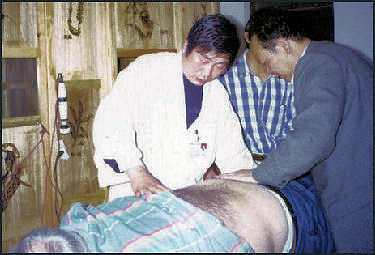
Chinese doctor
Malaria is found in some rural areas in southern China, but there is no risk in the major cities and the northern and western parts of the country. Be especially careful in swampy areas and during the monsoon season. Chloroquine resistant strains have been confirmed. This means you should take a prophylaxis and mefloquine. Malaria mosquitos bite mainly at night so make sure you are protected then with a mosquito net, mosquito coils or insect repellent.
Hepatitis is a big problem. It accounts for a large proportion of deaths. Around 700 million Chinese, more than half the population, have had hepatitis B. Of these 120 million (10 percent of the population) are believed to be long term carriers, who can transmit the disease for years even though they show no outward symptoms. About 25 percent of these will ultimately suffer from some kind of complication related to the disease.
Hepatitis B is contacted by direct contact with an infected person’s blood or contact with the infected person’s bodily fluids, such as through sharing needles or having sex. Transmission is mainly through blood contact, such as a blood transfusion, or to a lesser extent from infected unsterilized needles, acupuncture and tattooing. Transmission through sex is rare. It can not be contacted through casual contact such as shaking hands.
Symptoms for hepatitis B include, jaundice, fatigue, abdominal and joint pain, loss of appetite, nausea and vomiting. Sometimes people never get symptoms. Unlike hepatitis A, hepatitis B can cause cirrhosis of the liver (a disease which kills liver cells and impairs the ability of the liver to perform vital functions), liver cancer and permanent liver damage.
Hepatitis B is incurable but it can be prevented with a vaccine. For those that get it, full recovery is likely but 10 percent of hepatitis B sufferers become chronic carriers and are at greater risk for cirrhosis and liver cancer. The drug interferon reduces the chance of a return of the disease. It is effective in about 30 to 40 percent of patients.
Hepatitis B is difficult to bring under control because many carriers are symptomless yet the can still transmit the disease. One of the main reasons you should avoid blood transfusions is the risk of getting hepatitis B. One of the main reasons you should get a hepatitis B inoculation is in the event that you have an accident while traveling abroad and are given blood infected with hepatitis B in a transfusion.
The vaccine for hepatitis B that is widely available. First offered in the United States in 1991, it consists of a series of three shots (an initial dose, a second dose one or two months later and a third dose 4 to 12 months after the first). After the second dose you can consider yourself inoculated for the short term. The third shot is a booster. The Hepatitis B vaccine provide protection for at least 15 years.
Influenzas of various kinds are a problem, especially in the winter. See Health.
Schistosomiasis (bilharziasis) has become a serous problem in China, particularly in southern China. The Three Gorges Dam project us expect to increase the spread of the disease. Schistosomiasis is caused by a blood fluke (tiny worm also called a flatworm) that goes through a complicated life cycle utilizing a species of freshwater snail. After maturing inside a human host, adult flukes pair for life and produce thousands of eggs that damage organs and are discharged in urine and feces. The larvae that hatch from the eggs work their way into the snails that in turn produce large number of larvae capable of penetrating human skin. The flukes lives in the veins, bladder and large intestine of their human hosts and borrow molecules form their hosts to wear on their surfaces so the hosts’ immune system can't recognize them as alien.
Schistosomiasis is painful. Infection often occurs two to three weeks after exposure to the contaminated water. Symptoms include fever, lack of appetite, weight loss, abdominal pain, weakness, headaches, joint and muscle pain, diarrhea, nausea and coughing. Rarely, the central nervous system is involved. Chronic infections can cause disease of the lungs, liver, intestines and/or bladder.
Since there is no practical way to distinguish infested water from non-infested water, fresh water swimming should be avoided except in chlorinated swimming pools. The snails are usually more common in shallow, still water near shorelines and places with reeds, grasses or where human excrement has been discharged. The disease can be carried by insects and fish and can be contacted by drinking contaminated water (purification with iodine or chlorine kills the flukes) There is no chance of acquiring schistosomiasis in salt water.
The schistosomiasis can be treated with effective oral drugs (usually Nirdazole). Treatment involves one or two pills that cost about US$1. Routine checks for the disease are advised if you have been some place where you make have contacted the disease. Diagnosis of infection is usually confirmed by microscope examinations of stools and urine.
Parasites and Worms: According to one survey 700 million Chinese (62 percent of the population) are infected with at least one kind of parasite, and up to 90 percent of the children in some rural areas suffer from chronic worm infections — roundworm, whipworm and hookworm — which can stunt growth and cause deficiencies in mental ability.
Hookworm: An estimated 200 million people in China have hookworms — sharp-toothed parasites that attach themselves to intestinal walls and suck blood. They can stunt growth and cause anemia and lethargy. Hookworm enter the body through the skin, often bare feet, and travel through the blood to the lungs and reach they stomach when they are coughed up and swallowed. From the stomach they move to the intestines, where they can reach lengths of four inches (most are less than a half inch).
People can be infected by a thousand worms that can live for or five years and can collectively suck up to a cup of blood a day. Hookworm is treatable but people who live in areas where it is found tend to get it repeatedly. The parasites favor damp, cool environments and are particularly common in cotton, rapeseed and tobacco fields.
Dengue Fever: There was a surg in the number of dengue fever cases reported in southern China in the summer of 2006. Dengue fever is a nasty, viral disease transmitted by the “Aedes mosquito”, usually the “Aedes aegypti”, the same mosquito that often carries yellow fever. Sometimes called "breakbone fever" or "break-heart" because of the intense pain it can produce, the disease is characterized by sudden onset of fever; intense pounding, frontal headaches; aching bones and joints; nausea and vomiting; and a feeling of being too sick to eat anything. Other symptoms include severe sweats, chills, and excruciating chest pains. Tests foe dengue rely on the presence of antibodies, which can take up up to a week to develop.”
Nine out of 10 people who get dengue fever don’t even feel it or get a mild case in which they feel something akin to a slight flu. People who get full-blown dengue fever are sick for a week or more. Many patients have a rash, which appears 3 to 5 days after the onset of the disease, and experience severe emotional and mental depression during the recovery period. Most cases of the disease are benign and self-limiting although convalescence may take a long time.
A few people with dengue fever suffer gastrointestinal bleeding. Fewer still suffer brain hemorrhages. In about 1 percent of cases dengue fever can cause a severe and often fatal hemorrhagic disease called dengue hemorrhagic fever (DHF) that occurs when capillaries leak and the circulatory system collapses..
Dengue fever has no vaccine and no cure. Most victims that show symptoms recover on their own with rest and hospital care. Dengue fever can be avoided by staying out of endemic areas (the Center of Disease Control can tell you where they are) and protecting oneself against mosquitos.
Meningitis: In February 2005, there were reports of bacterial meningitis in Anhui Province, In the summer of 2006, 160 people contacted meningitis from eating undercooked giant Amazonian snails at a Beijing restaurant. All the victims recovered. Bacterial meningitis is the more serious and potentially fatal form of meningitis. Symptoms include severe headaches, progressive drowsiness or confusion, vomiting, irritability, high-pitched crying (especially among very young children), a stiff neck and sometimes painful sensitivity to light and a sore throat. In the days before antibiotics, most victims died. Today the survival rate is 90 percent (most fatalities occur among the very young and very old). The disease is treated with antibiotics and diagnosed with a spinal tap (after a local anesthesia for pain is administered a hollow needle is inserted in the vertebrae and a small sample of spinal fluid is collected).
Japanese Encephalitis: In 2003, 211 cases of encephalitis and 13 deaths attributed to the disease were reported in Guangdong Province. Japanese encephalitis is a mosquito-born viral disease that usually infects people in rural areas in the summer and autumn in temperate regions and some parts of Asia It is transmitted chiefly by the “Culex vishui” and “Culex tritaeniorhyncus” mosquitos, which bite mainly in the afternoon and evening and develop from larvae found mainly in cultivated rice fields and marshes. People traveling in rural areas have a stronger likelihood of contacting the disease than those who stay in urban areas. Most people who are infected display no symptoms, but the fatality rate is as high as 30 percent among victims who are hospitalized. Severe swelling in the head and central nervous system are manifestations of severe cases of the disease.
There is a vaccine that is given in a series of two or three injections one or two weeks apart. There is no medical cure but most victims recover on their own with rest and hospital care.
SARS is not a problem now. See Health.
AIDS: A survey conducted by the WHO and released in January 2006 estimates the number of HIV and AIDS cases in China is around 650,000, down from the 840,000 estimated in 2003. The decrease was due not to a reduction in cases but because of an overestimation of HIV and AIDS cases in the past when some scientists said there could be several million people carrying the HIV virus in China, with over 1 million people being infected in Henan province alone.
Method of HIV-virus transmission (2004): IV drug use, 44 percent: blood transfusion, 4 percent; heterosexual sex, 19 percent; homosexual sex, 11 percent.
Rabies has become a serious problem in China. It kills more than 2,000 Chinese a year. A total 27,096 people were bitten by dogs in the first six months of 1996, an increase of 5.2 percent from 1995, the Liberation Daily reported. The number of cases of rabies in Guangdong Province there rose from 12 in 1996 to 115 for the first nine months of 2003, when worries about rabies prompted the government in Guangdong to kill 170,000 dogs. In 2005, rabies killed 2,245 people. Only 3 percent of China’s dogs are vaccinated against the disease
Experts blame the high rate of rabies on the breakdown of the rural; health care system. Dog owners in rural areas generally don’t vaccinate their animals because of the expense. A rabies experts at Guangxi University told the New York Times, “Many farmer are reluctant to get shots for their dogs because it’s not always free... The veterinary system at the township level has become very inadequate. There isn’t much investment into the system.
Rabies is an infectious fatal disease transmitted by a bite from infected animals, which includes dogs, bats, and raccoons, and varies from place to place. Rabies is an extremely painful disease. It works its way through the nervous system, beginning around the bite, and causes painful muscles spasms, especially around the throat and eats away at the brain and causes insanity. Victims usually die of hydrophobia (paralysis of the breathing muscles).
There is a pre-exposure immunization for rabies. It consists of three injections (dose 2 is given seven days after dose 1 and dose 3 is given 21 to 28 days after dose 2). A booster in necessary after two years. People who get the pre-exposure immunization still have to go through post-exposure immunization if bitten by a rabid animal. The treatment gives them more time.
People who have had the pre-exposure immunization and are bitten by a rabid animal get two injections (the second three days after the first). People who have not had the pre-exposure immunization and are bitten by a rabid animal get seven injections (one big one at the bite area, another big one in the butt and then five more in butt on days 0, 3, 7, 14 and 28).
The rabies virus can be easily killed. If you are bitten by an animal you should immediately wash the wound with copious amounts of soap and throughly clean the wound with soap and water and then disinfect it with a cotton swab dipped in a disinfectant such as Detol, or if nothing better is available, alcohol. Then seek out a doctor immediately for an anti-rabies vaccine.
Several types of vaccine are available. The ones that offers the maximum amount of effectiveness with a minimal amount of pain are the human diploid cell vaccine, imported from France, and purified chick embryo cell vaccine, imported from Germany. The latter is very expensive but can be taken in the arm rather the stomach.
Other Diseases: Outbreaks of cholera and bubonic plague (outbreaks in 80s in Yunnan and Qinghai) have occurred in China. Cholera spread because dishes are often washed in dirty water and chopsticks are simply wiped off and used. Many travelers carry their own chopsticks. Millions of people have dysentery. Visceral leishmaniasis has been reported in Xinjiang.
MEDICAL HELP
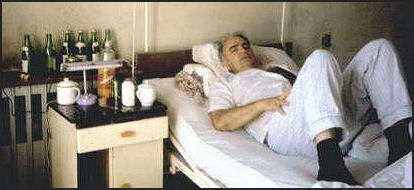
Chinese hospital
Medicines: Many medicines that are obtained with a prescription in Western countries, including birth control pills, can be obtained over the counter in China. Pharmacies are usually well stocked. There is a serious problem with fake and counterfeit medicines.
Medical Facilities are generally excellent but expensive in the major cities are limited in some rural areas. Many doctors speak English and have received foreign training. Emergency care is limited. Larger hotels often have a list of English-speaking doctors that are on call for visitors. They are often the best doctors in town. Sometimes they are not. Before you leave on your trip find out where NGO workers and diplomats receive medical help. Some people advise getting emergency evacuation insurance in case of illness
Medical Insurance and Payment: Check with your medical insurance company to make sure you are covered overseas. If you are not it may be a good idea to get traveler’s insurance.
Medical insurance coverage fees depend on the length of time a person stays. Check if evacuation from the country you are traveling in to your home country is covered.
Payment in cash is usually required after treatment in local hospitals and clinics. A call to an ambulance cost around US$40; a doctor visit, US$14 to US$20; one day in a hospital, US$50. See Appendix III for a list of Travel Insurance companies.
For More Information call check with Center for Disease Control in Atlanta CDC , tel. (404)-332-4559, 4555). English-Speaking Doctors: You can gain access to a worldwide list of recommended English-speaking, Western-trained doctors 24 hours a day by contacting the International Association for Medical Assistance for Travelers (IAMAT, IAMAT , 417 Center Street, Lewistown NY 14092, tel. (716)-754-4883. IAMAT is a non-profit organization. Membership is required. The service is free. You can also contact the U.S. Embassy or consulates in China.
Medical Assistance you can try MEDEX MEDEX tel. 800-537-2029), the International SOS Web site (a travel insurance company, International SOS ;MedicAlert MedicAlert tel.888-633-428).
International SOS is a company that offers a wide range of health assistance services including access to SOS medical clinics, 24 hour numbers for medical information and assistance, health alerts, help finding qualified doctors and dentists, and interpreter services. Founded in 1974, it has 44 offices around the world and a staff of 2,600, including 250 doctors. Membership costs about US$400 a year.
CRIME
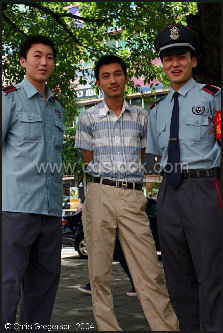
Police in Shenzhen
China has a low crime rate partly because the punishments for crimes are so harsh. Nevertheless, the crime rate has increased along with economic prosperity. There are thefts of pocketbooks, wallets, backpacks and fanny packs in the big cities and on crowded trains and buses. In Beijing, razor blade thieves like to work the crowded buses. A number of thefts have also been reported on trains, particularly in the hard-seat carriages on overnight trains.
Foreigners are generally not victimized by violent crime. If they are and the criminals are caught they are dealt with harshly. In 2000, two men who robbed a Shanghai-based American diplomat and one man who robbed two Dutch tourists for about US$80 worth of Chinese currency were sentenced to death.
Among the scams oriented towards foreign tourists are contacts on the street by self-described art students who try to steer foreigners they snag on the streets into phony art galleries and get them to pay large sums of money for prints of art works.
Precautions Against Crime: If possible keep valuables (money, passport, credit cards and airplane ticket) in a hotel safe. Some hotels charge a fee to use their safes. Also make copies of all your documents (passport, China visa, tickets, tour vouchers), credit cards and travelers checks receipts. Keep one set with you in a different place from your originals and another set at home.
It is a good idea to have 1) a money belt or neck pouch, and 2) buttoned pockets and 3) to distribute you money and valuables among them. Visitors are advised not to carry cash in their pockets and never count money in public. It also is a good idea to keep small bills in your pocket so you don't have to pull a big wad of cash, thus displaying your wealth, to make a small purchase.
Don’t take unnecessary valuables with you. Bring modest clothing and things that won’t break your heart if they are stolen. Avoid purses, backpacks and fanny packs. They are vulnerable to razor attacks. Pare down the contents of your wallet. Don’t bring a lot of credit cards and store cards and don’t bring anything with your social security card number on it (the primary object of identity thieves). If you carry a backpack don’t keep anything valuable in it or wear it front of you. If you have a handbag keep it tucked under your arm. Wallets are better kept in a front pocket rather than a rear one. Some recommend wrapping it rubber bands to make it difficult to slide out.
Be careful at night because the streets aren't lit very well. Avoid unlit areas and underground passages. Watch your bags and cameras. It is not a bad idea to have a piece of wire running through the shoulder straps of your bags. If you sit at an outdoor café and have a bag it is a good idea to fasten your bag to chair somehow.
Bring copies of you’re your passport to carry with you in case your hotel requires that you keep your passport there. Some people scan their passports, driver’s licenses and credit cards and sending the files to an e-mail address. That way if they get stolen you can access them anywhere there is a computer and Internet connection.
If your get robbed immediately cancel your credit cards, notify airlines of missing paper tickets and head straight to the nearest embassy to replace your passport. Reporting the crime to police is often useless but is often necessary to make an insurance claim. Often it is a good idea to seek help from your hotel reporting the incident to police.
Illegal Drugs: Even though marijuana and opium and other drugs are found in some parts of China, the penalties for drug possession are stiff. Be careful. You don't want to end up in a Chinese jail.
Police : If you get questioned by police go with the flow. If you have done something like enter an area restricted to foreigners, often you are required to make a confession, saying you did enter the zone, then sign three times, each time with a fingerprint stamp and pay a fine of US$10 or US$15.
BASIC TRAVELER GUIDELINES
Basic Traveler Guidelines follow the basic principal “leave things as you found them”: 1) before you trip familiarize yourself with the customs, health risks, security problems of the place you are going to visit; 2) dress in away that doesn’t offend the local people; 3) respect scared sites; 4) respect the privacy of people 5) in rural area stay on designated trails and roads; 6) don’t disturb wildlife; 7) stay clear of breeding sites for wild animals and fragile environments; and 8) do not buy souvenirs made from endangered animals.
Villagers rarely see foreigners. If the do see one, they are a source of endless fascination and villagers will stare and stare and stare. It is not uncommon for crowds of a hundred people to gather around strangers and tourists. Children often come up to tourists, clamoring for candy, money or pens. Sometimes a mob scene develops when a tourist actually gives out something and everyone kid wants one. Sometimes the children get hostile and throw stones.
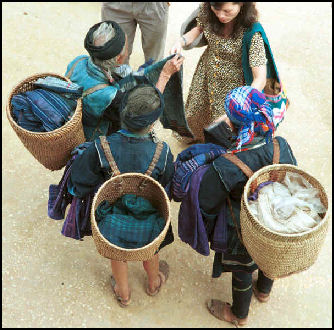
Miao
Minority Etiquette: 1) Many ethnic groups fear photography. Don’t photograph anyone or anything without permission first. 2) Show respect towards religious objects and structures. Don’t touch anything or enter or walk through any religious structure unless you are sure it is okay. If in doubt ask. 3) Don’t interfere in rituals in any way. 4) Don’t enter a village house without permission or an invitation. 5) Error on the side of restraint when giving gifts. Gifts of medicine may undermine confidence in traditional medicines. Gift of clothes may encourage them to abandon their traditional clothes.
Temple Customs: Busy Chinese temples are smokey places crowded with Chinese who light bouquets of smoking joss sticks, say prayers, leave behind jade orchid blossoms as offerings, throw “sheng bei” (fortune-telling wooden blocks) and donate ghost money to variety of ancient gods in return for things like good luck on the lottery, good scores for children on important exams and good business.
Temple goers burn fake money for longevity and set fire to paper cars and TV sets at funerals. In 1995, the Chinese government banned the practice of burning money during ancestor worship ceremonies because the custom was officially deemed a fire hazard and a superstition.
K’o t’ous (kowtows) are bows performed as acts of worship. Worshipers at local temple for the Dragon King bow three times before an image of deity, place incense sticks before it, cast lots of numbered bamboo sticks and make donations. Pilgrims visiting temples sometimes line up and stop every few steps and bow. The Chinese sometimes get very upset when tourists invade working temples and take photographs of worshipers.
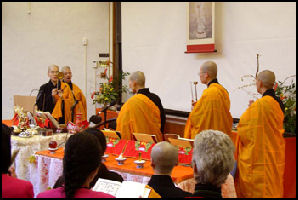
Buddist monks engaged in a ritual
Buddhist Temple Customs: People are supposed to take off their shoes before entering a temple and leave umbrellas outside. They are also expected to be neatly dressed. Hats should be removed. Short sleeve shirts, short pants, short skirts and pants for women are generally regarded as inappropriate attire but are often grudgingly tolerated from foreigners. Some cultures require visitors to take off their shoes (and sometimes their socks) when entering the temple grounds. Others only require that they be removed when entering a temple building, shrine or pagoda. Some people wash their feet before entering a temple.
Always walk clockwise around Buddhist monuments, thus keeping the religious landmarks to your right (this is more important in Tibet and Himalaya areas than it is in Southeast Asia) Don't walk in front of praying people. Don’t take photos during prayers or meditation sessions. Don’t use a flash. As a rule don’t take photos unless you are sure it is okay.
Buddha images are sacred object and one should not pose in front of them or point their feet at them. When sitting down many local people employ the “mermaid pose” to keep both feet pointed towards the rear. Photographing Buddha images is considered disrespectful, but again, is tolerated from foreign tourists.
Praying is done by prostrating oneself or bowing with hands clasped to their foreheads from a standing or seated position in front of an image of Buddha. Prayers are often made after tossing a coin or banknote into an offering box and leaving an offering of flowers or fruits or something else. Many people visit different altars, leaving some burning incense and praying at each one. Other bow at the altar and sprinkle water, a symbol of life. Other still, kowtow before shrines, bend down and stretch three times. In big temples money can be left in a donation boxes near the entrance. If there is no donation box. You can leave the money on the floor.
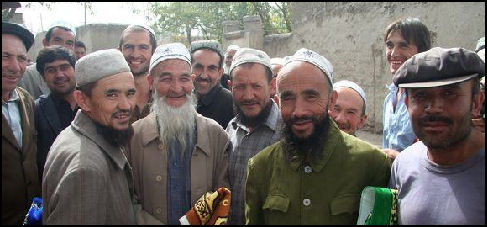
In Islamic Areas visitors can show respect and avoid hassles and unpleasantness if they abide by Islamic customs. Women should wear a long dress, cover their legs, arms and hair in public or in the presence of men who are not relatives. Western women can generally get away with wearing a long floor-length or ankle-length skirt and a loose-fitting, thigh-length blouse or jacket and a head scarf. Skirts at knee level or less, shorts and trousers are sometimes frowned upon. Men in short pants are sometimes not well received.
Mosques and Islamic shrines sometimes do not allow non-Muslims to enter. Non-Muslims that are welcomed into a mosque are expected to be appropriately dressed: no shorts, short skirts, revealing halter tops or exposed shoulders. Mosques that allow women often require them to at least wear a head scarf. Some require them to cover their entire bodies, except the face, hands and feet, and not wear trousers. Sometimes mosque provide women who don’t have one with a head scarf. Sometimes they have robes for men wearing shorts.
The Muslim faithful are expected to remove their shoes and wash their feet in a sacred basin before they enter the mosque. If no water is available Muslims are supposed to wash themselves with sand. Foreigner visitors s can usually get away with just removing their shoes and are not required to wash their feet. In any case, make sure you feet or socks are clean. Dirty feet in a mosques are regarded as an insult to Islam. In large mosques you remove your shoes and place them on a shelf with a number.
Inside a mosque don't walk in front of someone who is praying, don't touch the Koran, never sit or stand on a prayer rug and never place a Koran on the floor or put anything on top of it. Also, don't cross your legs in front of an older people and don't step over someone who is sitting down Show respect, remain quiet and stay out of the way. Taking photographs is frowned upon.
Medical Facilities and Health: See Health
Warning to Women: China is generally pretty safe but Chinese men can be very sexist. Women should not walk alone at night or take a taxi late at night. They should dress modestly, and avoid wearing anything revealing like halter tops or short shorts except when at the beach.
Areas of Unrest: Activity in Tibet and Xinjiang flares up from time to time. Demonstrations are held in other places in China over a number of issues: pollution, development, police brutality.
Clothes, Smoking and Toilets
Clothing: Most clothing styles are acceptable. Some Chinese dress smartly and fashionably. Most dress in drab, nondescript slacks, shirts and jackets. Wearing shorts and jeans is okay, but don't wear clothes with holes. Dirty or shabby clothing is sometimes interpreted as an expression of disrespect. Even though you see men in without shirts and people wearing their pajamas to the market don’t imitate these styles You can wear ordinary clothes to the Peking opera.
Women in shorts skirts, jeans or tights and men in short pants and informal clothes are common in the cities but may offend some people in the countryside. Keep in mind also that shorts, exposed shoulders and short skirts are may be regarded unacceptable in some temples. See Above
Smoking: Smoking is very much part of Chinese culture. Many Chinese like to smoke not only after a meal but during a meal. Expensive cigarette brands like Panda and Zhonghua are commonly given as presents to bosses and parents and are offered as welcoming gesture to house guests.
Smoking is banned in public places like hospitals, schools, railway stations and government buildings. But enforcement is spotty. In is not uncommon to see men — even doctors — smoking below non-smoking signs in the cancer wards of hospitals. Smoking is common in restaurants. In 2008, Beijing’s first smoke-free restaurant chain said it might go out of business because is customers had deserted en mass (as high as 80 percent at some restaurants) after a smoking ban was put in place a few months earlier.
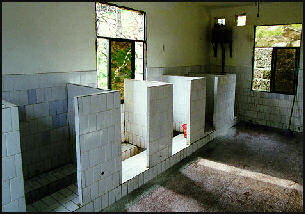
public toilet
Toilets and Water: Most toilets are Asian-style squat toilets or a hole in the ground. Upscale hotels and restaurants usually have Western-style toilets; sometimes the don't have seats. Bring along toilet paper or tissues. Many restrooms don't have toilet paper. Asian style toilets often have a small cement tank next to it with some water and a plastic scoop inside. The water is there to clean your butt and flush the toilet. Many Asian sewer systems can not handle toilet paper. You are expected to put used toilet paper and tissue in a wastebasket rather than in the toilet. Otherwise the paper might clog the pipes.
Toilets are sometimes identified with pictures a man or woman. Many rest rooms have the words "men" and "women" written on them. Other are color-coded with pink for women and blue for men. Most public restroom are cleaned by an attendant who expects a small payment and sells tissue paper for small money. Bathroom Web site: Bathroom Diaries
Public toilets are found in parks, stations, recreation areas, department stores, hotels, restaurants, shopping centers, subway, bus and train stations and near tourist sites. McDonald's is a good place to go in an emergency. Some cafes will let you use their toilet if you don't buy anything.
Water is often in short supply. In some places hot water or water only comes at certain times of the day: usually the morning and the evening. Sometimes water will cut off when you are using it. People often keep buckets and tanks with water near the sinks in case this happens. Wealthy families have water tanks on their roofs that store water when the water is one for use when it isn’t.
Public Baths: Some homes don’t have a bath or shower. People bath once or twice a week at the local public bath, where people like to gather and socialize.
Other Warnings
1) Register with your consulate when you arrive and memorize their phone number. 2) Don't take photograph from an airplane or photograph anything that can be construed as a military target. 3) Ask for permission before photographing people. 4) The roads are poor, and the national airlines has a poor safety record. 4) Fuel shortages and power outages are common. Some small towns have no electricity or heat. 6) Bring toilet paper, soap, sunblock, condoms, tampons, razor blades, extra glasses or contact lenses, sanitary napkins, prescription drugs, a flashlight and a light bulb for your own use.
7) Many Chinese have never seem a white person before, let alone a black. Off the beaten track, places, the sight of a European foreigner, is enough to make people stop on the street and stare and attract small gawking crowds. 8) Drivers involved in automobile accidents sometimes end up jail. 9) Signs in museums are often not in English. Opening and closing times and closed days of museums varies quite a bit from place to place. Some museums have separate fees for taking photographs and using video equipment.
10 ) Be careful about buying anything that might be construed as an antique or a treasure. Removal of antiquities from the country is serious crime. Tourists have landed in jail for this. Keep receipts of anything for anything questionable so you can offer them as proof that items are souvenirs not treasures. 12) Video cameras sometimes require a permit. Visitors using video cameras from the United States are advised to bring enough blank cassettes. China uses the European-style PAL-Secam system, which is not compatible with U.S. systems.
13) It goes without saying that one should not sunbathe in the parks, have picnic on museums steps, or wear shorts and chew gum in museums. 14) The police sometimes hassle foreigners but generally they do not try to shake them down for bribes. 15) People are routinely asked to produce their passports.
16) It is best to visit the tourist sights at the crack of dawn before the bus tourists arrive. 17) People tell you don’t worry, no problem when there are problems. 18) Build in extra time for doing stuff in case something goes wrong. 19) It is good to have a guide at some of the historic places. There often guides waiting at the entrance. Quiz them to make sure they are knowledgeable and negotiate a price. 20) There are lots of pushy touts trying to get to buy trinkets and guest house rooms.
21 ) Some English teachers have had problems getting their money. 22) Foreigners have had their passports seized in commercial disputes. If this happens the US Embassy will give you a new passport but even with a new passport people have had problems getting out of the country.
23) people sign with a chop rather than signature. 24) Some dinnerware and cups have glazing that may have lead in it.
24) Commonly counterfeited products include CDs, computer software, foreign cigarettes, medicines, watches, wines, auto parts, books, Tibetan jewelry, Qing coins, Marlboro cigarettes, Sony Walkmens, Maxell tapes, Rolex watches, Coca-cola, Pabst beer, "Chrysler" jeeps, lottery tickets and certificates that state antique items are genuine. Also be on the watch out for fake train tickets, Y100 notes, lottery tickets and receipts that state antique items are genuine. See Economics
25) In Shanghai and other cities there are touts that pretend to be interested in speaking English with foreigners and then try to steer them to a shop, gallery or restaurant that gives them a commission for anything sold. Vendors that sell counterfeit merchandise and souvenirs can be a little pushy. 27) Don’t give anything to begging children. Sometimes if you give something to one child or a small group, words gets around fast and mob appears.
Also See Health, Money, Hotels, Air Travel, Driving.
Measurements and Dates: China, like most countries in the world, uses the metric system to measure distances and quantities and the centigrade system to measure temperature. Chinese clothing and shoe sizes are different from American sizes.
Chinese use the 24 hour clock (i.e 20:00 instead of 8:00pm) and the a.m and p.m. system. They also write their dates different, with the year preceding the month and day. April 23, 1999 is 23/4/99 not 99/4/23 as Americans write it.
Travel Advisories
U.S. State Department Advisories: tel. (202)-647-5225; Fax: (202)-647-3000; Electronic bulletin board: (202)-647-9225. Web site: Travel.State.gov British travel warnings: fco.gov.uk . Australian travel warnings: dfat.gov.au/travel .
Travel Advise Web sites: Lonely Planet Lonely Planet Lonely Planet’s Thorn Tree Thorn Tree
Image Sources: 1) CNTO (China National Tourist Organization; 2) Nolls China Web site; 3) Perrochon photo site; 4) Beifan.com; 5) Landsberger posters; 6) Harvard Education;
Text Sources: Center for Disease Control, United States State Department, CNTO, New York Times, Washington Post, Los Angeles Times, Times of London, National Geographic, The New Yorker, Time, Newsweek, Reuters, AP, Lonely Planet Guides, Compton’s Encyclopedia and various books and other publications.
